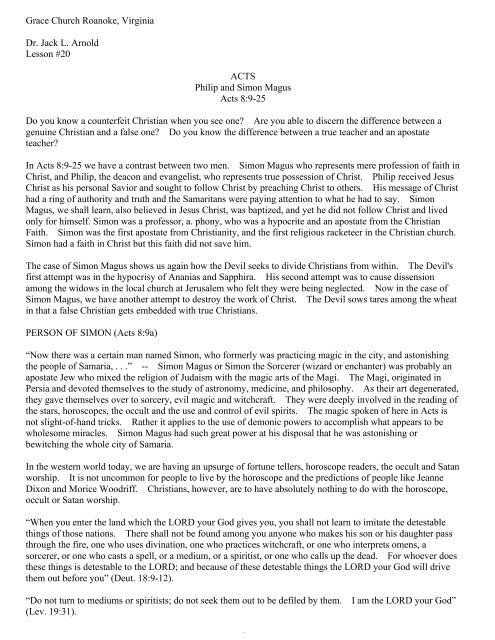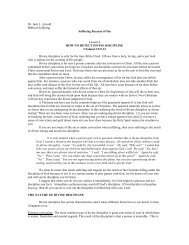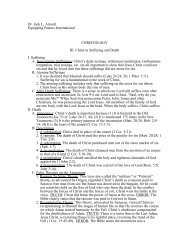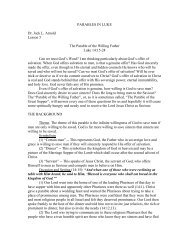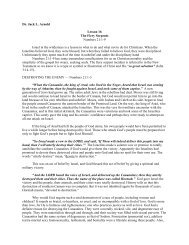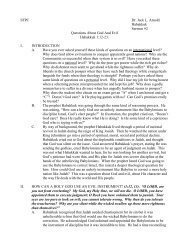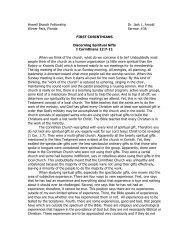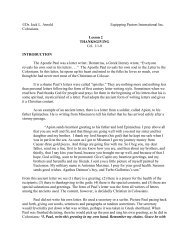Grace Church Roanoke, Virginia Dr. Jack L. Arnold ... - Clear Theology
Grace Church Roanoke, Virginia Dr. Jack L. Arnold ... - Clear Theology
Grace Church Roanoke, Virginia Dr. Jack L. Arnold ... - Clear Theology
Create successful ePaper yourself
Turn your PDF publications into a flip-book with our unique Google optimized e-Paper software.
<strong>Grace</strong> <strong>Church</strong> <strong>Roanoke</strong>, <strong>Virginia</strong><br />
<strong>Dr</strong>. <strong>Jack</strong> L. <strong>Arnold</strong><br />
Lesson #20<br />
ACTS<br />
Philip and Simon Magus<br />
Acts 8:9-25<br />
Do you know a counterfeit Christian when you see one? Are you able to discern the difference between a<br />
genuine Christian and a false one? Do you know the difference between a true teacher and an apostate<br />
teacher?<br />
In Acts 8:9-25 we have a contrast between two men. Simon Magus who represents mere profession of faith in<br />
Christ, and Philip, the deacon and evangelist, who represents true possession of Christ. Philip received Jesus<br />
Christ as his personal Savior and sought to follow Christ by preaching Christ to others. His message of Christ<br />
had a ring of authority and truth and the Samaritans were paying attention to what he had to say. Simon<br />
Magus, we shall learn, also believed in Jesus Christ, was baptized, and yet he did not follow Christ and lived<br />
only for himself. Simon was a professor, a. phony, who was a hypocrite and an apostate from the Christian<br />
Faith. Simon was the first apostate from Christianity, and the first religious racketeer in the Christian church.<br />
Simon had a faith in Christ but this faith did not save him.<br />
The case of Simon Magus shows us again how the Devil seeks to divide Christians from within. The Devil's<br />
first attempt was in the hypocrisy of Ananias and Sapphira. His second attempt was to cause dissension<br />
among the widows in the local church at Jerusalem who felt they were being neglected. Now in the case of<br />
Simon Magus, we have another attempt to destroy the work of Christ. The Devil sows tares among the wheat<br />
in that a false Christian gets embedded with true Christians.<br />
PERSON OF SIMON (Acts 8:9a)<br />
“Now there was a certain man named Simon, who formerly was practicing magic in the city, and astonishing<br />
the people of Samaria, . . .” -- Simon Magus or Simon the Sorcerer (wizard or enchanter) was probably an<br />
apostate Jew who mixed the religion of Judaism with the magic arts of the Magi. The Magi, originated in<br />
Persia and devoted themselves to the study of astronomy, medicine, and philosophy. As their art degenerated,<br />
they gave themselves over to sorcery, evil magic and witchcraft. They were deeply involved in the reading of<br />
the stars, horoscopes, the occult and the use and control of evil spirits. The magic spoken of here in Acts is<br />
not slight-of-hand tricks. Rather it applies to the use of demonic powers to accomplish what appears to be<br />
wholesome miracles. Simon Magus had such great power at his disposal that he was astonishing or<br />
bewitching the whole city of Samaria.<br />
In the western world today, we are having an upsurge of fortune tellers, horoscope readers, the occult and Satan<br />
worship. It is not uncommon for people to live by the horoscope and the predictions of people like Jeanne<br />
Dixon and Morice Woodriff. Christians, however, are to have absolutely nothing to do with the horoscope,<br />
occult or Satan worship.<br />
“When you enter the land which the LORD your God gives you, you shall not learn to imitate the detestable<br />
things of those nations. There shall not be found among you anyone who makes his son or his daughter pass<br />
through the fire, one who uses divination, one who practices witchcraft, or one who interprets omens, a<br />
sorcerer, or one who casts a spell, or a medium, or a spiritist, or one who calls up the dead. For whoever does<br />
these things is detestable to the LORD; and because of these detestable things the LORD your God will drive<br />
them out before you” (Deut. 18:9-12).<br />
“Do not turn to mediums or spiritists; do not seek them out to be defiled by them. I am the LORD your God”<br />
(Lev. 19:31).<br />
1
“As for the person who turns to mediums and to spiritists, to play the harlot after them, I will also set my face<br />
against that person and will. cu t him off from among hi s people” (Lev. 20:6).<br />
POSITION OF SIMON (Acts 8:9b)<br />
“Claiming to be someone great; . . .” -- Simon was a braggart, a boaster, obsessed with his own greatness.<br />
He made mighty claims about his own person and powers. He was the first century Mohammed Ali who went<br />
around saying, “I am the greatest; I am the greatest.” Simon was his own P. R. man for he was able to cast a<br />
spell over the people to make them think he was someone great. He undoubtedly had great powers of<br />
persuasion.<br />
What a contrast between the false and the true. Philip preached Christ, Simon preached himself. Philip<br />
evangelized with the truth of the gospel. Simon amazed people with his tricks. Philip told men of the great<br />
Savior who died and rose again from the dead for sinners and who gives forgiveness of sins and eternal life to<br />
all who believe in Him. Simon preached that men were to believe in him and his programs. There are<br />
multiple thousands of people today who follow men rather than Christ. People follow the so-called faith<br />
healers. They follow the Rev. Sun Myung Moon who claims to be the Messiah. They follow Joseph Smith<br />
or Mary Baker Eddy. There are always phonies, false teachers and religious racketeers who get a following<br />
because they are dynamic personalities with the power to persuade people. One reason they are so successful<br />
is that they have the demons working for them.<br />
POPULARITY OF SIMON (Acts 8:10, 11)<br />
“And they all, from smallest to greatest, were giving attention to him, saying, ‘This man is what is called the<br />
Great power of God.‘ And they were giving him attention because he had for a long time astonished them<br />
with his magic arts.” -- Simon Magus was the most popular man in town. The populace worshipped him<br />
either as a power from God or God Himself. They probably came to believe that God had incarnated Himself<br />
in Simon Magus. Perhaps Simon was the Samaritan Messiah to answer the claims of Jesus Christ, the true<br />
Messiah. Whatever, Simon had the city in the palm of his hand. They were under his spell.<br />
PROFESSION OF SIMON (Acts 8:12, 13)<br />
“But when they believed Philip preaching the good news about the kingdom of God and the name of Jesus<br />
Christ, they were being baptized, men and women alike.” -- The gospel came to the superstitious<br />
Samaritans with their horoscopes, witches and beads through the deacon and evangelist, Philip. Philip may<br />
have been the greatest preacher of his day and he was only a deacon. He was not ordained. He was not a<br />
professional clergyman. He was a layman called to preach the gospel. The gospel came to Samaria and<br />
great numbers of people were turning from their witchcraft and turning to Jesus Christ. The truth of Jesus<br />
Christ was capturing souls for heaven because whenever the gospel is preached men will be saved. “For I am<br />
not ashamed of the gospel, for it is the power of God for salvation to everyone who believes, the Jew first and<br />
also to the Greek” (Rom. 1:16).<br />
“And even Simon himself believed; and after being baptized, he continued on with Philip; and as he observed<br />
signs and great miracles taking place, he was constantly amazed.” -- Simon was apparently caught up in the<br />
spirit of revival and he made some kind of act of faith in Christ and was even baptized. We do not know<br />
exactly why Simon believed but it is not too hard to deduce. First, Simon knew a real miracle worker when<br />
he saw one and he wanted the power to work miracles that he saw in Philip. Second, he probably felt that if<br />
he did not join up with Philip and the Christian movement, his business would be hurt. Whatever his motives<br />
were for coming to Christ, they were not genuine. His profession was made because he thought it would<br />
prove advantageous to himself, and he was never concerned about the redemption of his own soul. Simon<br />
was probably sincere as far as he understood but there was no real commitment to Jesus Christ. His faith was<br />
in miracles and not in Jesus Christ, the Savior. Simon was never regenerated by God; he was a fraud and<br />
sham. Simon went through all the external exercises he thought were necessary to become a Christian, but he<br />
2
was unchanged. His heart beat only for Simon and not for Christ as the rest of this account will make<br />
perfectly clear. Simon was even able to deceive Philip. He attached himself to Philip as is usually the case,<br />
for a new convert to Christ attaches to the person who led him to Christ. Perhaps Philip was like many<br />
evangelists in our day. He may have lacked spiritual discernment and was a little naive in that he was not<br />
willing to wait patiently for the fruit to flow from Simon's life so there would be definite proof of his<br />
conversion. Spurgeon said, “The mark of an unregenerate heart is an unchanged life.” Arthur Pink said,<br />
“How you begin salvation in this life is not nearly as important as how you end up salvation at the end of life.”<br />
Whatever the reasons, Simon was able to con and fool Philip as to his real spiritual state.<br />
What an important conversion this was. This was Simon Magus, the Devil’s ace man in Samaria. He was<br />
Mr. Pagan himself. He was the leading figure in this city. Perhaps this even worked on Philip's pride a little.<br />
Simon was up to this point probably the greatest catch for Christ in the first century. His so-called conversion<br />
can be compared to the so-called conversion of Larry Flynt of the famed pornographic magazine “Hustler.”<br />
This was a super catch for Christ. Yet, Simon believed but he had not believed. He had a faith that did not<br />
save.<br />
Becoming a Christian is not done by any external acts - walking an aisle, raising a hand, signing a card, praying<br />
a stereotyped prayer, being baptized, having a religious experience such as speaking in tongues or having a<br />
vision. Externals save no one. Only those who trust in Christ to save them from their sins are truly saved.<br />
Simon was an unbeliever who got into the local church. Local churches and whole denominations have been<br />
weakened and rendered ineffective by unregenerate people coming in, taking the outer garments of<br />
Christianity, calling themselves Christians, but remaining unchanged in heart and life.<br />
Right after my oldest son, Mark, was saved I often referred to his new found faith in Christ as a profession.<br />
One evening Mark took me aside and said, “Dad, I have not professed. I have received Christ and possess<br />
Christ.” I said, “I accept your profession, Mark, and I believe it to be real, but we must wait to see if genuine<br />
fruit appears in your life before we can say that conversion has taken place.” He did not like my explanation.<br />
Then he went to college, a Christian college, and discovered how many kids in that college had professed<br />
Christ but showed no fruit of salvation in their lives. When Mark came home from college, he said, “Dad, I'm<br />
sure glad you called my initial belief in Christ a profession and waited for fruit to come. I now know it is<br />
possible to have some kind of superficial faith in Christ that is not saving faith because so many kids at college<br />
are just playing the game.”<br />
How many Christians make a profession of faith for wrong reasons and with wrong motivations.<br />
Businessmen mouth words about Christ and join a church to sell their products. Women say they are<br />
Christians to be in a high society church to give them recognition and prestige. A guy will make some<br />
profession of faith in order to get some gal to go out with him or even marry him. God always knows the<br />
motivations of the heart.<br />
POURING OUT OF THE SPIRIT ON THE SAMARITANS (Acts 8:14-17)<br />
“Now when the apostles in Jerusalem heard that Samaria had received the word of God, they sent Peter and<br />
John, . . .” -- Philip undoubtedly got word back to the Apostles, telling then that a great turning to Christ<br />
had taken place in Samaria. People were being converted right and left. The news of the conversion of<br />
Simon Magus also hit the Christian headquarters in Jerusalem. When the Apostles received the news, perhaps<br />
they were a little skeptical about those glowing reports from Samaria, so they wanted to know if the situation<br />
was real or was just an exaggerated evangelistic report by Philip who was trying to impress them with numbers<br />
and big names. Whatever the situation, the Apostles sent Peter and John to Samaria to give a firsthand<br />
Apostolic report.<br />
“Who came down and prayed for them, that they might receive the Holy Spirit. For he had not yet fallen on<br />
any of them; they had simply been baptized in the name of the Lord Jesus. Then they began laying their<br />
hands on them, and they were receiving the Holy Spirit.” -- This verse at face value seems to teach that the<br />
3
Samaritans received the Holy Spirit after they believed. Can a person be saved without the Holy Spirit?<br />
Was this some second work of grace? This is a very difficult verse and in some ways it does not fit my own<br />
theology, even though I have an explanation for it.<br />
View #1: Second Experience After Conversion<br />
This is the traditional Pentecostal-Charismatic view. These folks believe that a person is saved and receives<br />
the Spirit for salvation at that time, but then a person must receive the baptism of the Holy Spirit sometime later<br />
for sanctification and the manifestations of the Spirit, namely the gift of tongues. This baptism is received by<br />
the laying on of hands.<br />
View #2: Delay of the Baptism of the Holy Spirit to Put the Samaritans into the Body of Christ<br />
The book of Acts is a book of transition from the Old Testament dispensation to the New Testament<br />
dispensation. The Samaritans were half-breeds, half-caste, who were not fully Jewish. They had their own<br />
rival worship system to Jerusalem. The Jews and the Samaritans hated one another and both claimed to be<br />
the true followers of Jehovah-God. There was, therefore, a need to delay, in this particular case, the baptism<br />
of the Holy Spirit, putting these Samaritan believers into the body of Christ, so as to avoid two rival factions in<br />
the Christian church. The Samaritans had the Holy Spirit because they believed in Christ and they were<br />
regenerate, but they were not yet put into the body of Christ. They were still separate, individual, regenerate<br />
Christians, much like the Apostles and the one hundred twenty had been before the Day of Pentecost. There<br />
was a need to make a connection between the believers in Samaria and the believers in Jerusalem. Therefore,<br />
the Apostles Peter and John laid hands on them, identifying them with the Apostolic ministry and at that time<br />
they were put into the Body of Christ. Had this not been the case, the Samaritans may have thought that their<br />
brand of Christianity was distinct from the brand in Jerusalem, and there would have been two churches which<br />
would have destroyed the unity of the infant church. There is no specific mention of tongues in this context,<br />
although there may have been the special gifts of the Spirit bestowed at this time (including tongues) because<br />
Simon saw some kind of manifestation when hands were laid on the Samaritans.<br />
If tongues were present, we must remember they were a sign to unbelieving Jews and they were to be a<br />
testimony to unbelievers about the truthfulness of the Apostolic message. Tongues are never a sign to<br />
believers but to unbelievers.<br />
PROPOSITION OF SIMON (Acts 8:18, 19)<br />
“Now when Simon saw that the Spirit was bestowed through the laying on of hands, he offered them money,<br />
saying ‘Give this authority to me as well, so that everyone on whom I lay my hands may receive the Holy<br />
Spirit;’” -- Simon was deeply impressed with the manifestations of the Spirit he saw come on the<br />
Samaritans and he wanted the same power to lay hands on people. He was even willing to pay a handsome<br />
price for this power. Of course, his motivation was monetary gain, and he knew that if he could possess the<br />
power given to the Apostles, his influence would increase and, charging outrageous prices, he could confer this<br />
same power upon others and multiply his fortune. The spiritual blindness and ignorance of Simon were now<br />
beginning to manifest themselves. Given enough time a true phony will declare himself. Simon insulted the<br />
Apostles and God by suggesting that the gift and the power of the Holy Spirit, made available through Christ,<br />
could be bought with money. Simon understood absolutely nothing about God's sovereignty in giving the gift<br />
of salvation by grace. “For by grace you have been saved through faith; and that not of yourselves, it is the<br />
gift of God; not as a result of works, that no one should boast;” (Eph. 2:8, 9). He was a total stranger to grace,<br />
for he was convinced that God's gifts could be worked for or bought. This proposition of Simon’s showed the<br />
real heart of the man. He was a professor, not a possessor; counterfeit, not genuine. His lust for power,<br />
prestige and money finally got the best of him, and by his actions, not his words, he declared himself a<br />
non-Christian. He was a religious racketeer who used Christian things to make a profit.<br />
From Simon we get the word "simony” which is the sin of trying to buy religious office and/or power with<br />
money, a very common practice in the history of the church.<br />
4
PERVERSION OF SIMON (Acts 8:10-23)<br />
“But Peter said to him, ‘May your silver perish with you, because you thought you could obtain the gift of God<br />
with money!’” -- Simon propositioned the wrong man. Peter was a rough and tough fisherman who did<br />
not care about money and he hated religious bribes. Literally the Greek says, “Perdition take your silver” or<br />
“To hell with your silver.” What Peter was saying was “You and your money are both going to hell if you do<br />
not change your attitude.” Thank God for men like Peter who do not compromise truth for money. What a<br />
temptation money is to preachers today. Someone asked his minister what he wanted for his church and he<br />
said, '“More members and more money!” Members and money are needed to carryon the Lord’s work but<br />
they should never influence a preacher to compromise truth.<br />
“You have no part or portion in this matter, for your heart is not right before God.” -- The Apostle Peter,<br />
who had the gift of discernment, made it emphatically clear to Simon that he had no portion of God's grace in<br />
his heart, that he was in no sense a partaker of salvation nor possessor of the Holy Spirit. Simon had believed<br />
in Christ in an intellectual way but his heart was unchanged. God alone knows a man’s heart. “. . . for God<br />
sees not as man sees, for man looks at the outward appearance, but the LORD looks at the heart” (I Sam. 16:7).<br />
This one act of Simon brought forth his real character. It showed the true condition of his heart. Jesus said,<br />
“Ye shall know them by their fruits” (Matt. 7:16). God knows the heart and men can only be fruit inspectors.<br />
Because Simon had an unchanged heart. he manifested the works of the flesh. He was a phony, a fake, a<br />
fraud, pretending to be something he was not.<br />
The tragedy is that Simon thought he was a Christian. He had given intellectual assent to Christ but had never<br />
committed his life to Christ. He was religious but not regenerated. He had gone through all the external<br />
things to be a Christian but his heart was unchanged. He was near the kingdom but far from it. He was<br />
almost a Christian but was Christless. He was nearly persuaded, but was not persuaded. Simon had his faith<br />
in miracles, in baptism, in Philip and even in himself but he did not have genuine faith in Christ and never<br />
committed his life to Him.<br />
There are many people today in churches who have their faith in baptism, confirmation, church membership<br />
and good works but this faith does not save a soul from destruction. Men may also have faith in the doctrine<br />
of eternal security (a biblical truth) and not in Jesus Christ. Doctrine does not save; only Christ saves.<br />
Those who truly believe in Jesus Christ will have a changed heart and desire the things of God. The mark of a<br />
regenerate heart is a changed life.<br />
“Therefore repent of this wickedness of yours, and pray the Lord if possible, the intention of your heart may. be<br />
forgiven you.” -- Peter called upon Simon to repent which is always used of salvation in the book of Acts.<br />
Simon was to change his mind about his sin and present lifestyle and turn to Christ for forgiveness and a new<br />
kind of lifestyle. He was to repent and pray. He was to change his mind about God, about Christ and about<br />
sin and he was to ask God to forgive him. Notice it was God's prerogative to forgive or not forgive because<br />
he says, “if possible.” Who does the Lord forgive? All those who with a right intention of heart see<br />
themselves sinners, under God's wrath, and headed for hell, and turn to Christ and ask for forgiveness. God<br />
reads the intention of the heart, and if there is true salvation, there will be proof through spiritual works flowing<br />
through the life of the Christian.<br />
“For I see that you are in the gall of bitterness and in the bondage of iniquity.” -- Simon, with the act of<br />
trying to buy God's free gift with money, indicated he knew nothing of salvation. This is not a state that<br />
Simon lapsed back into but a state he was still in. He was still in bondage to sin; he was enslaved to iniquity.<br />
He had never been set free. Simon was a baptized church member who was enslaved to sin because he had<br />
never really committed his life to Jesus Christ whom to know is life eternal.<br />
“Mistaken souls, that dream of Heaven,<br />
And make their empty boast<br />
Of inward joys and sins forgiven,<br />
5
While they are slaves to lust!<br />
Vain are our fancies, airy flights,<br />
If faith be cold and dead;<br />
None but a living power unites<br />
To Christ, the living head.<br />
A faith that changes all the heart;<br />
A faith that works by love;<br />
That bids all sinful joys depart,<br />
And lifts the thoughts above.<br />
Faith must obey our Father's will,<br />
As well as trust His grace;<br />
A pardoning God is jealous still<br />
For His own holiness.”<br />
PETITION OF SIMON (Acts 8:24)<br />
“But Simon answered and said, ‘Pray to the Lord for me yourselves, so that nothing of what you have said<br />
come upon me.’” -- Peter had just told Simon he had to repent and pray to God himself if he was to be<br />
saved, but here Simon asked Peter to pray for him. Simon had no real conviction about his sin so as to ask<br />
God to have mercy on his sinful soul. He asked Peter to pray that judgment and hell would not come upon<br />
him. Simon did not want to go to hell but he also did not want to deal with his sin. He wanted deliverance<br />
from the consequences of sin but he did not want to face his sins honestly before God. Simon wanted Christ<br />
as Savior but not as Lord. He wanted to be a disciple but did not want discipleship. He wanted heaven but<br />
refused to deal with his sin.<br />
Peter could not forgive Simon’s sins and Simon refused to make a personal commitment to Christ. God alone<br />
can forgive sins, not a preacher, not a priest, not the Virgin Mary, but only Christ forgives sins as the sinner<br />
repents and prays for forgiveness.<br />
PLIGHT OF SIMON<br />
Simon Magus is not mentioned again after Acts 8 but I have no doubt that unless he repented, he is in hell<br />
today. Extra-biblical literature does tell us about Simon Magus. In the apocryphal books, Simon is spoken<br />
of as being the father of the Gnostic heresy. Wherever he went he opposed the gospel violently. He became<br />
the arch-apostate from the Christian Faith. He hated everything about Christ. What a tragedy. This man<br />
was at the very threshold of salvation, but instead of taking that final step of turning to Christ, he turned away<br />
from Christ and continued in the bonds of iniquity. He was close to the kingdom but not in. He was an<br />
almost Christian.<br />
PREACHING THE GOSPEL (Acts 8:25)<br />
“And so, when they had solemnly testified and spoken the word of the Lord, they started back to Jerusalem,<br />
and were preaching the gospel to many villages of the Samaritans.” -- Apparently Peter, John and Philip<br />
went back to Jerusalem, evangelizing other Samaritan cities on their way home.<br />
One just senses that these early Christians were totally convinced that God would supernaturally work as they<br />
went about preaching the gospel. They knew people would be saved. “And when the Gentiles heard this,<br />
they began rejoicing and glorifying the word of the Lord; and as many as had been appointed to eternal life<br />
believed. And the word of the Lord was being spread through the whole region” (Acts 13:48, 49).<br />
CONCLUSION<br />
6
Are you like Simon Magus? Have you believed in Christ but have no changed heart? The Bible says you<br />
are lost because your faith is superficial and intellectual. Are you an almost Christian? Almost persuaded<br />
but not committed? The Bible says you are lost. Have you accepted Christ as Savior but never bowed to<br />
Him as Lord? The Bible says you are lost. Are you one who desires to escape hell and go to heaven but are<br />
not willing to conform to Christ and deal with your sin? The Bible says you are lost. Are you a phony, a<br />
counterfeit, a sham and a pretender? The Bible says, “Test yourselves to see if you are in the faith; examine<br />
yourselves!” (II Cor. 13:5)<br />
If you are not a Christian, you have either not placed your faith and trust in Christ alone for salvation or you<br />
have not surrendered to Him as King. You can miss salvation at either place. The evidence that you have<br />
found Christ's salvation is that your faith results in a changed lifestyle. Any other kind of faith is not true<br />
saving faith. Have you come to that place where you can honestly say as the hymn writer of Jesus, Lover of<br />
My Soul, “Other refuge have I none; hangs my helpless soul on Thee.”<br />
7


